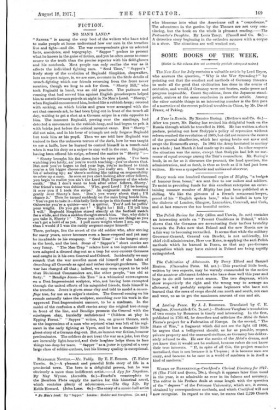FICTION.
NO MAN'S LAND.* " S.srama " is among the very best of the writers who have tried to make people at home understand how our men in the trenches live and fight—and die. The war correspondents give us selected facts, anecdotes, and topography. " Sapper " prefers to present what ho knows in the guise of fiction, and yet he often seems to come nearer to the truth than the precise reporter with hie field.glasses and his notebook. Most people can only realize the war as it affects tho individual fighting man. " Seed Time," " Sapper's " lively story of the evolution of Reginald Simptins, shopwalker, into an expert sniper, is, we are sure, accurate in the little details of trench-fighting which our friends returning from the front never mention, though we long to ask for them. " Shorty Bill," who took Reginald in hand, was an old poacher. The patience and cunning that had served him against English gamekeepers helped him to outwit German patrols at night in No Man's Land. " Shorty," when Reginald encountered him, looked like a rubbish-heap; covered with sacking, on which bricks and grass were arranged with the net that conceals art, he had been lying out in front of the trench all day, waiting to get a shot at a German sniper in a rain opposite to him. The innocent Reginald, peering over the sandbags, had detected a movement in the rubbish-heap, and had begun to pelt it with bricks just bolero the critical moment came. But " Shorty " did not miss, and in his hour of triumph not only forgave Reginald but took him as his pupil. Then we aro told how Reginald was trained to face the unknown terrors of the dark, how he was taught to use a knife, how he learned to control himself in a trench-mid when it was his duty as a sniper to stay well in the rear. Reginald, having been offered his stripe, referred the matter to " Shorty "
" Shorty brought his fist down into his open palm. ' I've been watching you lately, an' you're worth teaching—you've shown that. But now you've begun to feel your logs, you're inclined to think you're a bit bigger cheese-mite than you really are. You want a bit o' sobering up ; an' there's nothing like taking on responsibility to sober up a man. As soon as you start looking after other fellows, you begin to realise you ain't the Lord High Emperor of the whole outfit.' But I don't want to look after other fellows, Shorty.' Our friend's tone was dubious. ' Why, good Lord I I'd be bossing it over you if I took the stripe.' An enigmatic smile wreathed gently over Shorty's face. ' Don't you worry about that ; I'll chance it.' Then he turned suddenly on the man lying beside hint. ' You've got to take it—this belly little stripe in this funny old array. Otherwise you're a quitter—see f a quitter. You'd not be puffin' your weight. Do you got me 1' Right ho I Bill ; I'll tell him I will.' Reginald Simpldns stared silently at the football match for a while, and then a sudden thought struck him. Say, why didn't you take it, Shorty ? " Never you mind ; there are things as you can't get a hold of as yet. I pull more weight where I am, nip son, than I would if I was the ruddy sergeant-major himself.' " There, perhaps, lies the secret of the old soldier who, after serving for many years, never becomes even a lance-corporal and yet may be invaluable to his company. " Seed Time " is the longest story in the book, and the best. Some of " Sapper's" short stories are very funny. " The Man-Trap " relates how a too ingenious subal- tern adapted a disused dug-out as a trap for over-curious Germans and caught in it his own General and Colonel. Incidentally we may remark that the war novelist must rid himself of the habit of describing all Generals as aged and rather decrepit gentlemen. Tho war has changed all that ; indeed, we may soon expect to be told that Divisional Commanders are, like other people, "too old at forty." " Bendigo Jones—his Tree " is a whimsical extravaganza on a Post-Impressionist sculptor, who, not having been exempted through the united efforts of his misguided friends, finds himself in the trenches. Jones is given some clay and told to model a camou- flage tree, for use as a wiper's station. The General coming on his rounds naturally takes the sculptor, mouthing over his work in the approved Post-Impressionist manner, to he a madman. In the midst of the confusion a shell carries away the original tree-stump in front of the line, and Bendigo presents the General with the misshapen clay, hurriedly rechristened " Children at play in Epping Forest." " Sapper " writes, too, on graver themes, such as the impressidns of a man who rejoined what was left of his regi- ment in the early fighting at Ypres, and he has a dramatic little ghost-story of a German dug-out. But, as inmost war fiction, humour predominates. The soldiers do not treat the war as a joke, but they are incurably light-hearted, and their laughter helps them to face things too deep for tears. " Sapper " as a jester is typical of a very largo class of soldier-authors, but his literary quality is exceptional.


























 Previous page
Previous page